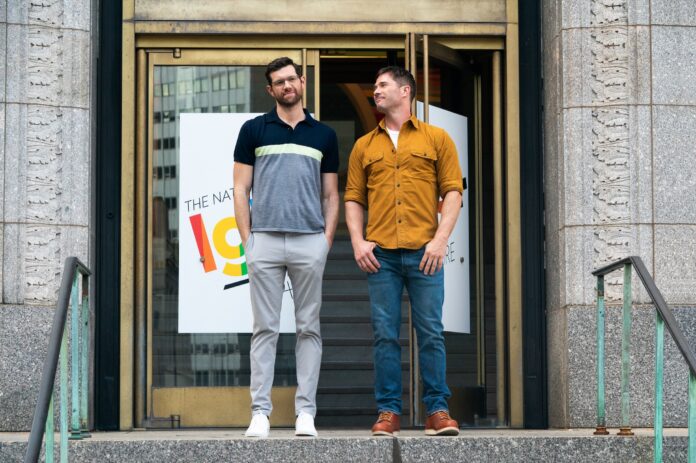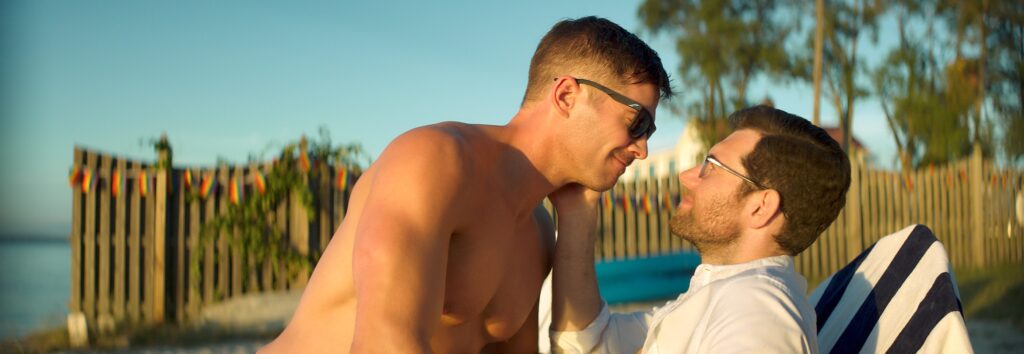
In the gay romcom, “Bros,” the hyperverbal, cynical, and jaded Bobby Leiber (Billy Eichner), falls for the hunky, relationship-phobic Aaron Shepard (Luke Macfarlane). They are complete opposites; the outspoken Bobby is heading up an LGBTQ+ history museum and is adamant about not erasing queer history, while Aaron is a quiet probate attorney who is described as “boring” by one of Bobby’s friends. So, of course, these guys are perfect for each other.
Cowritten by Eichner, this very amusing comedy shows that vulnerability and confidence can be sexy as the guys struggle to couple up. “Bros” may feature several hilarious fourgies, but the film is more about heart, and finding out who and what you love.
Eichner and Macfarlane are two of the many out gay actors in “Bros,” which has a large queer inclusive cast; it is the first gay romcom from a major studio. The guys met with Philadelphia Gay News to talk about “Bros.”
One of the questions the film asks is how gay are you supposed to be? For Bobby, it is very, and for Aaron, it is more reserved. What are your thoughts on expressing one’s sexuality and presenting yourselves as gay men?
Eichner: I think it’s a bit generational. Gay men of our generation, more than the younger generations, had certain challenges. For me and my friends, we were all relatively comfortable with being gay and grateful to come out, but what we struggled with was masculinity. The movie is asking a lot of questions about that because I think our culture in general — not just for gay men, but for men in general — has put masculinity on a pedestal for many years. In the past handful of years, and for the younger generations, and the way they embraced their femininity, gender fluidity, it is definitely evolving for the better. But up to that point, it’s been an issue for a lot of men. Especially in my younger years, it was something that went through my head a lot. How am I supposed to act and be sexy? A lot of that came down to, oh, I need to be more masculine.
It’s about passing. ‘Do I sound gay?…’
Eichner: All the codeswitching we’ve had to do over the years. I’ve noticed that not only in myself, but in all my gay male friends, so I think it’s something people can really relate to.
Macfarlane: The question of masculinity is so interesting. Yes, we have evolved, but it is fascinating the sort of obsession that certain governors have with the loss of masculinity in our culture. Why are they so concerned about that? I don’t think it’s threatening anybody. For myself, masculinity is being exactly who you are. That is part of my strength and part of my muscle that I am totally comfortable with who I am.
The film both celebrates and satirizes the romcom tropes, leaning into the cliches to create humor and comment on why we buy into them. What is romantic to you?
Eichner: I think what is romantic is what the movie is about: What happens when two guys, both openly gay their whole lives, both sexually active, put intimacy and love and romance at arms’ length. They pride themselves on being self-reliant, and not needing to be in a relationship like other people do, and they have made themselves impenetrable. I think what is romantic is when you let that guard down.
Macfarlane: One of the times when my heart melted the most was when a partner of mine told me how they were bullied as a kid. That vulnerability is very, very sexy.
Eichner: Being vulnerable, you’re opening yourself up to potential hurt and criticism as much as you’re opening yourself up to potential love and comfort. We’re scared to expose ourselves in that way. It is easier to get naked sometimes than it is to reveal yourself emotionally. Especially when you really care about the other person because you’re saying to yourself, I want this person to see me as I am, but if I let them see me, will they still like me?
Macfarlane: Will they still want to have sex with me?
Eichner: Yeah.
Macfarlane: YEAH!

I like that the film is very focused on showing and learning gay history. And the film is making history as the first LGBT romcom from a major studio. What history did you learn making the film? Or what should folks go discover?
Eichner: I was shocked by how much I didn’t know. And part of that is my own fault for never doing the research, and part of that is society’s fault and our country’s fault for leaving LGBT history out of textbooks and out of school curriculums. We’re never taught about ourselves. It’s bad for straight people, and it’s bad for LGBTQ people. None of us learn about how much we have contributed to history to culture to art and to science. We are not just playwrights. We have contributed to all facets of society since the beginning of civilization, and no one ever talks about it unless you take it upon yourself to do the research, which I did for this movie, and I was shocked by how much I didn’t know.
Macfarlane: I got to tell Billy about someone here in Philadelphia today. I’m a big fan of revolutionary American history for some reason, as a Canadian, and I was talking about [Friedrich Wilhelm August Heinrich Ferdinand] Von Steuben, an important American general, who was at Valley Forge. He was an openly gay man. He was George Washington’s buddy. People knew that, and they were hanging out back in the day. But we never learn that. We learn all about what they ate at Valley Forge, but we don’t know about the person and the life of this guy.
What observations do you have about gay men and dating? Are they all horny, selfish and stupid?
Eichner: I think there are definitely moments where we are horny, selfish, and stupid, and there are moments when we are clearly the smartest people in the room, the most confident, and most self-reliant. That’s what “Bros” is about, painting a picture of gay men — especially the two at the center — as multi-dimensional. We are not cartoon characters. We’re not horny sex-crazed coke-snorting clubgoers — we are sometimes, and that’s fine — but that’s not all who we are. We’re not angels. Gay men are always depicted in this Madonna/whore way, extremely wholesome, or extremely promiscuous and dirty and doing all kinds of bad behavior. But we are all of those things at once, and that’s what we’re trying to show here.
Macfarlane: [laughs] I’ve certainly been that at certain times in my life. Absolutely.
